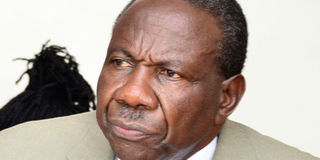Covid-19 strikes economy, govt to borrow Shs1.6t

Finance minister, Mr Matia Kasaija. FILE PHOTO
What you need to know:
Total public debt amounted to $12.55b as at end June 2019.
Uganda’s economy has been hit hard due to negative effect of the Covid-19 pandemic, the Finance minister, Mr Matia Kasaija, has said.
Government has decided to borrow up to $440m (about Shs1.6 trillion) from the World Bank and International Monetary Fund (IMF) to help the economy. Government will borrow $190m from the World Bank (WB) and $250m from the IMF.
“The industry and services sector are being affected by the disease. This is leading to disruption of supplies and loss of jobs,” Mr Kasaija said.
The minister said due to shocks the economy has suffered, the country has revised its growth rate from 6.0 per cent to between 5.2 and 5.7 per cent.
This is the second revision of the economic growth rate from the initial projection of 6.2 per cent contained in the Budget forecasts for 2019/2020. The exchange rate of the dollar to a shilling stood at Shs3,796 by yesterday.
In a statement about the economic implications of the pandemic presented last week, the minister said about 780,000 people would be pushed into poverty in the short run while as many as 2,600,000 risked the same fate in the long run.
Mr Kasaija said the loan requirement is premised on the fact that “there will be an additional shortfall in revenue collections of between Shs82.4b and Shs288.3b for the remaining period of the current 2019/2020 financial year and between Shs187.6b and shs350b in the 2020/21 depending on the severity of Covid 19.”
So far, the pandemic has paralysed the tourism sector, the country’s leading foreign exchange earner, through global travel restrictions.
“The exports are expected to decline by 64 per cent and the overall imports are expected to decline by 44 per cent in the last four months of this fiscal year,” Mr Kasaija said.
Loan conditions
Government will have up to 38 years to pay back the loan, with a grace period of six years. It will, however, be obliged to pay up to 0.5 per cent per annum on the unwithdrawn financing balance in commitment fees, and a 0.75 percentage service charge annually on credit balance.
From the International Monetary Fund, government will enjoy a 10-year interest free debt, and a grace period of five years and six months. Mr Kasaija said: “The loans will come quickly from disbursing emergency credit facilities set up by the WB and IMF to help countries deal with the negative effects of Covid-19.”
Total public debt amounted to $12.55b as at end June 2019. External and domestic debt accounted for $8.35b (66.5 per cent) and $4.2b (33.5 per cent) respectively.




